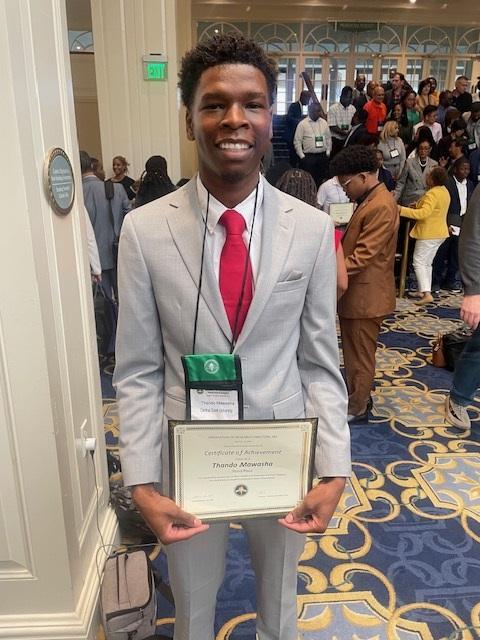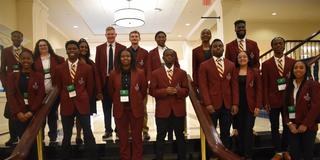
Students, faculty, staff researchers attend agricultural research symposium in Nashville

Twenty-five research abstracts from Central State University are among more than 1,100 submissions for the ARD Biennial Research Symposium 2024, April 6-9.
After months of preparation and toiling in research labs and test lots, more than two dozen Central State University undergraduate, faculty, and staff researchers departed campus to head to the 2024 biennial Association of 1890 Research Directors (ARD) Symposium at the Gaylord Opryland resort in Nashville, Tennessee.
The symposium, themed “Climate, Health and Cultivating the Next Generation of Agriculture Leaders: Creating Solutions in Food, Agriculture and Natural Resources,” was held April 6-9, marking the 21st anniversary of the biennial event, which moves to different venues around the country.
Central State’s 25 abstracts add to more than 1,100 submissions for the three-day symposium.
“The goal of the Symposium is to provide a forum for interactions, knowledge sharing, building networks for expanded partnerships and to showcase the talents and achievements of the 1890 (Land-Grant) community,’’ according to the ARD’s website.
A record 20 students, three professors, and two staff members represented CSU in Nashville, accompanied by 22 faculty research mentors, supporting staff, student ambassadors, and incoming President Dr. Morakinyo A.O. Kuti. Kuti currently serves as vice president of Research and Economic Development and director of the CSU 1890 Land-Grant Programs, established in 2014.
“It is the largest participation [at the ARD event] — a total of 48 attendees from CSU,” said Shafiqur Rahman, Ph.D., associate research director of 1890 Land-Grant Programs.
“Everyone will bring back some experiences with them and can be helpful from their own perspective. By attending conferences, the Institution is well-represented and recognized.”
The participating CSU contingent will compete in both oral and poster presentations privately in the presence of judges. Their agricultural research titles span a range of topics that, to name just several, include:
- “A conceptual tool for assessing the sustainability of small farms.”
- “Hemp workshop to support workforce training and community development.”
- “Machine learning methods to study effect of weather and climate change.”
- “The potential of novelty pumpkin varieties for increasing farm income.”
Sakthi Kumaran, Ph.D., CSU research associate professor of soil science and agronomy, offered a tight, five-minute oral presentation called “Special session 5” to introduce the so-called Molecular Observation Network (MONet) soil function.
Rahman, a recent CSU hire who has seen and participated in a few research symposia, said: “Disseminating and sharing their knowledge, networking, and professional development opportunities for both students and faculty” are the goals of the (ARD) symposium. “This kind of symposium provides a platform for faculty to find potential collaborators for future research project ideas.”
“The ARD symposium is the biggest platform for 1890 research institutions to showcase unique research, exchange ideas, and collaborate on large grant writing,” Rahman added.
Junior sustainable agriculture major Joel Barhorst said his faculty mentor, Marcus Nagle, encouraged him to participate in the symposium after he worked with Nagle last summer researching the viability and profitability of 25 varieties of pumpkin under Ohio’s climate, testing them on three area farms. Barhorst designed a survey instrument for the summer research and said that Nagle “thought it would be a good idea for me to present it at the symposium in Nashville.” Barhorst’s poster presentation is titled “The potential of novelty pumpkin varieties for increasing farm income.”
Feeling “everything – nervous, excited and confident about my project,” TreMia Hutcheson, junior agricultural education major’s title is “Exploring candidate loci for developing high amylose maize from bioinformatic databases.” Her two faculty research mentors, Luke Farno and Mark Campbell “motivated me to participate in the symposium. Honestly, it did not take much to persuade me to do it.”
In the long run, it will be to her benefit, she said.
“I hope that my participation will prepare me for the future by allowing me to practice my public speaking skills and build on my networking skills that will propel me forward in my career,” said Hutcheson, an international student from the Bahamas who plans to return, after further education in the U.S., to improve agriculture in the island nation.
In the end, diverse representation and participation at an event like the ARD symposium is a win-win for universities, faculty and students, according to Rahman.
“Presenting ongoing research will open up new opportunities and help [the participants] stay current in their research,” Rahman said. “That’s why the Nashville symposium is important to researchers and student participants.”
Graduating senior wins third place

Thando Mawasha, a graduating environmental engineering senior, won third place in the "Outstanding Achievement in Plant Health and Production and Plant Products for Undergraduate Competitive Poster Presentations" category.
Mawasha's presentation was titled, "Quantifying evapotranspiration of rainfed corn and soybean crops in southwestern Ohio using eddy covariance technique."
Mawasha was among more than 400 undergraduate students attending the nation's 19 Historically Black Colleges and Universities designated as 1890 Land-Grant institutions who made oral or poster presentations at the event.
"It is an honor to be a part of something so special, being in the company of individuals who share my desire for success," Mawasha said. "The bonus of receiving an award will make this an unforgettable experience."
"I think our students have done an excellent job that reflects the effort that the faculty has put forth for them to be prepared," added Gorgui Ndao, director of Student Success and Experiential Learning. "Win or lose, they've done an excellent job."
CSU students' exposure and their interaction with peers from other HBCUs is an invaluable benefit for participation in the national symposium, according to Marcus Nagle, research assistant professor of soil science who is mentoring three of the undergraduate researchers.
"Every student should feel like a winner. I know that they all worked hard in the high level of work that's being presented here," said Nagle. "I've been impressed one after the other of these students, seeing their posters, attending their presentations, reaffirming that the 1890s (Land-Grant institutions) are doing a stellar job, high-quality research, impactful, meaningful results — really impressive."


